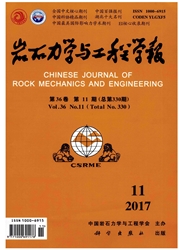

 中文摘要:
中文摘要:
针对浅层滑坡等海底地质灾害,设计并实施一系列的十字板试验和三轴试验,对低应力条件下典型海洋粉土的不排水强度特性进行研究探讨。试验结果显示:固结度对粉土的十字板强度有明显影响,十字板强度随着超孔隙水压力的升高而降低。剪切应变速率对粉土的固结不排水三轴强度影响很小,而超固结比和剪切围压则影响较大;三轴试验中各个试样都能够达到临界状态,临界状态强度随着超固结比和剪切围压的增大而增大。分析波浪作用下海床土剪切滑动的渐进特性,指出临界状态是滑坡发生时滑带土所能达到的最终状态。采用平均有效应力,对十字板强度和三轴临界状态强度进行归一化处理,两种强度显示较好的一致性,得到低应力条件下海洋粉土的临界强度线。最后,应用所得的临界强度线,对风暴潮作用下黄河水下三角洲粉土海床浅层滑坡及“复活”进行很好地分析和解释。
 英文摘要:
英文摘要:
A series of the vane shear tests and the triaxial tests investigating the undrained shear strength ot typical ocean silt under low stress conditions were carried out to understand the submarine geological hazards such as shallow landslide. It was found that the degree of consolidation affected the vane shear strength of silt and the vane shear strength decreased as the excess pore pressure increased. The triaxial undrained shear strength of silt is affected by the over consolidation ratio and the confining stress level but not by the shear strain rate. All samples reached the critical state in the triaxial tests and the shear strength at the critical state increased with the increase of the over consolidation ratio and the confining pressure. The vane shear strength and the triaxial undrained shear strength at critical state were normalized using the mean effective stress and the good consistency was found between them. The critical strength line of marine silt under low stress condition was obtained, which explained the reactivation of the submarine landslide by the storm wave in the Yellow River delta.
 同期刊论文项目
同期刊论文项目
 同项目期刊论文
同项目期刊论文
 期刊信息
期刊信息
